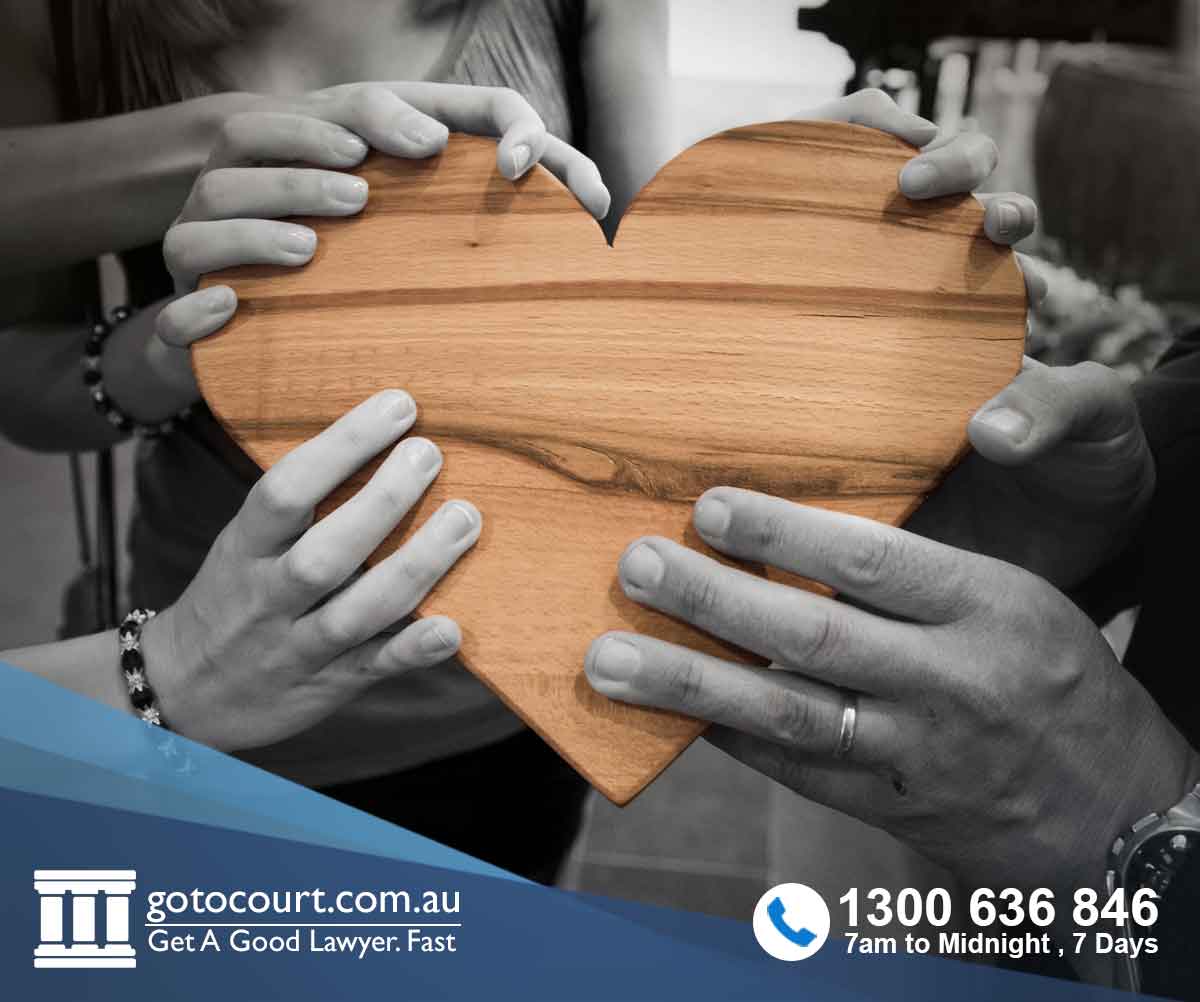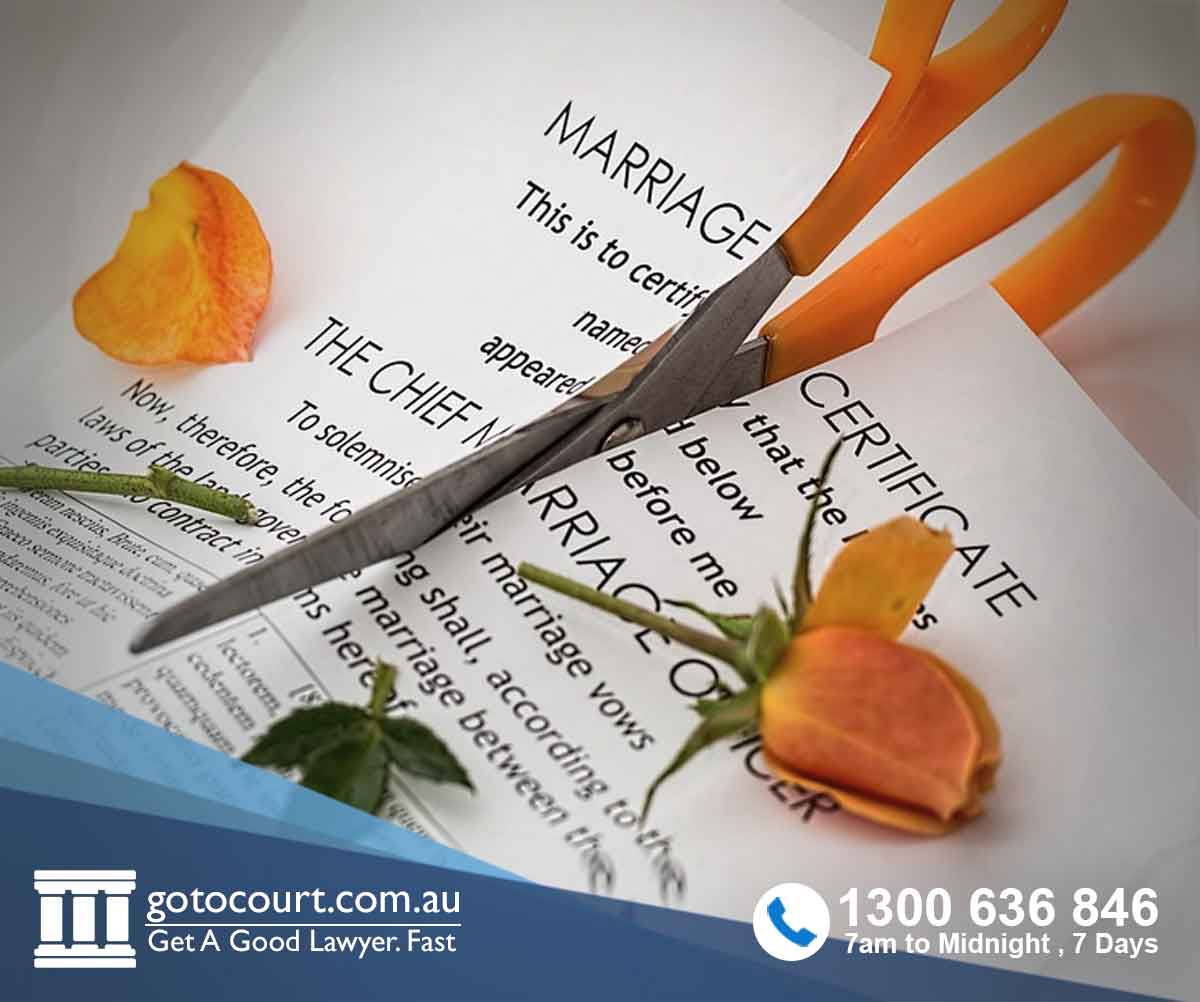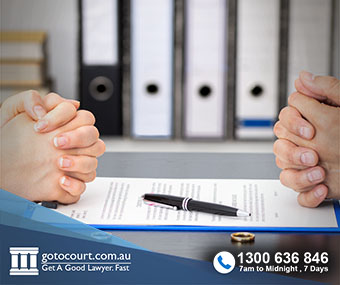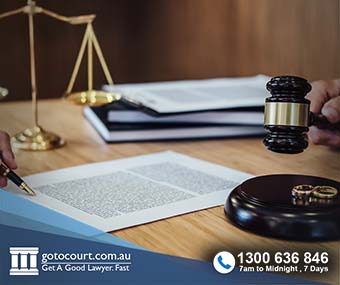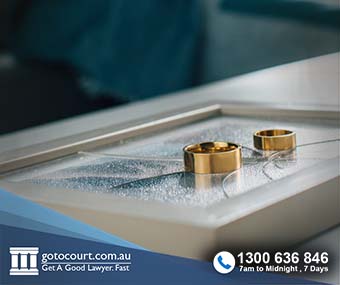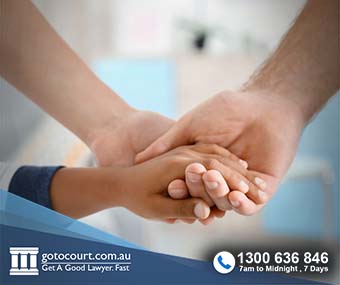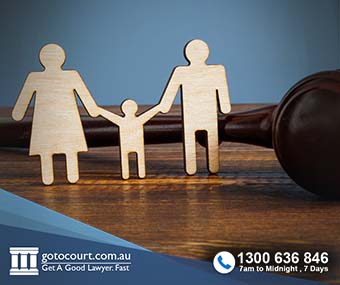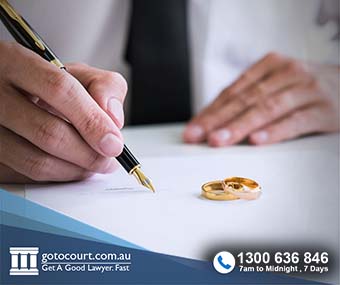Call our lawyers
now
or,
have our lawyers
call you
Divorce Application
Updated on Feb 01, 2023 • 7 min read • 2031 views • Copy Link
Divorce Application
The Federal Circuit and Family Court of Australia (FCFCOA) has jurisdiction to order the dissolution of marriage under the Family Law Act 1975. Australia has a “no-fault” system, meaning that the only ground for divorce is that there has been an ‘irretrievable breakdown’ of the marriage. This means that there is no real prospect of reconciliation. A person can apply on their own for divorce, or ask a lawyer to complete the application to ensure that there is no missing or incorrect information. This page looks at the process of filing a divorce application in Australia.
IMPORTANT INFORMATION: A divorce application does not address arrangements for the care of children or the division of marital assets and spousal maintenance. Go To Court lawyers can provide advice on dealing with these separate matters.
Eligibility
There are only three eligibility requirements for gaining a divorce:
1) Legal Marriage
First, the marriage must be legally recognised in Australia (because the court cannot dissolve a marriage it does not recognise to exist). For instance, a marriage in which one of the parties is a child is not recognised in Australia, even if it is legal in the country where it took place.
2) Connection to Australia
Second, to be eligible to apply for divorce in Australia, one of the spouses must have a connection to Australia. This connection is typically proven through citizenship because one of the parties was born in Australia or is a citizen by descent or grant. Also, it is sufficient if one of the parties has lived in Australia for at least the last year and intends to stay.
3) Separation
Finally, the couple must have been separated for at least 12 months. The start date of separation is usually the date when the couple no longer lives together. However, a couple can be separated and still live under the same roof. For instance, a separated couple might continue to live together because it is convenient, for financial reasons, or to provide uninterrupted care for children.
Application for divorce
Once the couple has been separated for the statutory period, one or both spouses can file an application for divorce. Divorce applications are filed online at the Commonwealth Courts Portal. An individual can apply for a divorce by themselves (a sole application) or with their spouse (a joint application). Both applications use the same online application, but the applicant must select the appropriate section of the form and complete the different process obligations.
When a couple lodges a joint application, one of the applicants completes the application. They then provide the other applicant with a copy to review and sign before it is submitted online. Conversely, with a sole application for divorce, one party (known as the ‘applicant’) applies. The applicant must serve the divorce papers on the other party (known as the ‘respondent’) within certain timeframes before the hearing date.
If the respondent wants to oppose the divorce, they can complete, file and serve a Response to Divorce and attend the divorce hearing. A respondent can only oppose the application because the couple has not been separated for 12 months, or that the court does not have jurisdiction to grant the divorce.
What is service?
Serving a document is a formal way of delivering something to the other party in a legal proceeding. This is usually completed by posting the letter to the other party’s ‘Address for Service’. Sometimes service must be ‘personal’, meaning that it is directly handed to the respondent. Learn more about serving divorce papers here.
Supporting documents
An Application for Divorce must include supporting documents. The three most common types of supporting documents are:
1) Marriage certificates
Most notably, a divorce application needs to include a copy of the marriage certificate. If the marriage certificate is not in English, the applicant must have the certificate translated by an approved practitioner and attach both documents to an Affidavit of Translation of Marriage Certificate.
If the applicant does not have their marriage certificate on hand, they must try and obtain a copy. For marriages in Australia, a certificate is easily obtained from the Births, Deaths and Marriages in the state or territory where the marriage took place. Applicants who were married overseas can contact the authorities in the relevant country to obtain a copy of the marriage certificate. If the applicant has not been able to obtain a copy of their marriage certificate despite reasonable attempts, they can file an affidavit with their application explaining the omission.
IMPORTANT INFORMATION: The names on the divorce application should be identical to those on the marriage certificate. If there has been a name change, the relevant supporting documents should also be uploaded.
2) Minor children
There is a section of the divorce application that is relevant if there are any children of the marriage under the age of 18. This includes any child treated as family, adopted or born of either spouse before, during or after the separation. The applicant must provide particulars about the child’s housing, care, schooling, grades, health and parental contact and financial support.
3) Counselling certificate
An applicant who has been married for less than two years must attach a counselling certificate to their divorce application. This certificate is proof that the couple has attended at least one session of counselling, and that there is no real hope for reconciliation. The Court will waive the requirement for a counselling certificate in special circumstances, such as a history of domestic violence in the relationship.
4) Separated under one roof
An applicant who has continued to live in the same residence as their former spouse must provide additional evidence to establish the separation. The applicant needs to prepare an affidavit explaining the circumstances, and ask a third party to file an affidavit corroborating the evidence.
Address for service
An applicant for divorce must provide an ‘address for service’. This is a postal address that the court can use to send correspondence and that the other party can use to ‘serve’ documents. If an applicant is living overseas, they must provide an Australian address for service. An applicant can use their spouse’s address for service (however, in this case, both spouses must file affidavits verifying that they are living separately and explaining the shared address for service).
Finalizing your divorce
Once the divorce has been granted, it will be finalized one month and one day later, unless the court has made a special order to shorten the time frame. To ensure that you are aware of when your divorce has been granted, you can log into the Commonwealth Courts Portal and opt to receive a notification email. This email will inform you when the divorce has been granted when it will be finalized, and provide instructions on obtaining a copy of the divorce order.
To download a copy of your divorce order, visit the Commonwealth Courts Portal at www.comcourts.gov.au and log in. Go to the “Available Files” tab, select “All,” and choose your file. Under the “Additional options for this file” heading, select “List of orders.” In the right-hand column, select “View Orders” in the row next to the “Hearing divorce” event type to open the digital order. It is recommended that you print the divorce order double-sided and in colour.
The divorce order has an electronic seal and signature and is considered an original order. This is the only official and original record issued by the court and serves as evidence that a divorce order has been made.
Divorce can be a complex and emotional process, and it is important to ensure that you have a clear understanding of the eligibility requirements and the necessary steps involved. If you have questions regarding your eligibility to file for divorce or require assistance completing a divorce application, it is advisable to seek professional legal advice. The court cannot provide legal advice as it must maintain impartiality in all proceedings. For expert support and guidance on any family law matter, we recommend contacting Go To Court Lawyers by dialling 1300 636 846. With a team of experienced and knowledgeable lawyers, they are equipped to provide comprehensive legal advice and representation on all aspects of family law.

Affordable Lawyers
Our Go To Court Lawyers will assist you in all areas of law. We specialise in providing legal advice urgently – at the time when you need it most. If you need a lawyer right now, today, we can help you – no matter where you are in Australia.How It Works







1. You speak directly to a lawyer
When you call the Go To Court Legal Hotline, you will be connected directly to a lawyer, every time.


2. Get your legal situation assessed
We determine the best way forward in your legal matter, free of charge. If you want to go ahead and book a face-to-face appointment, we will connect you with a specialist in your local area.


3. We arrange everything as needed
If you want to go ahead and book a fact-to-face appointment, we will connect you with a specialist in your local area no matter where you are and even at very short notice.









